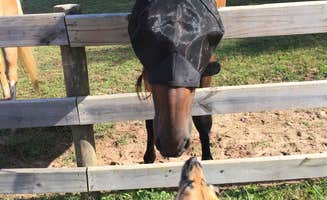Equestrian camping options near Cherry Log, Georgia allow access to extensive trail networks throughout the Cohutta Wilderness region. The forested landscape at approximately 1,700 feet elevation provides moderate temperatures for year-round horse camping, though summer humidity can be significant. Horse campgrounds in this area feature simple, functional sites designed primarily for equestrian access rather than comfort amenities.
What to do
Trail riding from base camp: Jacks River Fields Campground connects directly to the Benton McKaye Trail system. "There's a hiking trail that connects to the Benton McKaye just across from campsite and if you are a bringing horses there are two paddocks for them as well," notes camper Liz B.
Creek access for horses and riders: The Conasauga River watershed provides water access at several equestrian sites. At Cottonwood Patch Campground, the river "is accessible" though the campground is "not directly on the river," according to Bob P. This allows horses to cool down after rides.
Waterfall exploration: Multiple trails lead to scenic waterfalls within riding distance. At Hickey Gap Campground, "There is a beautiful waterfall about a mile down trail from camp and tons of great swimming areas!" reports John B. The Cohutta WMA contains numerous cascades accessible via horseback.
What campers like
Level sites for trailer setup: Most horse camping areas feature practical, level areas for parking horse trailers. "Level spots with picnic tables. Not directly on the river but is accessible. A lot of equestrians stay here but anyone can," writes Bob P. about Cottonwood Patch Campground.
Privacy and solitude: Despite being designed for equestrians, these campgrounds rarely fill completely. "The first time we camped here, we were the only ones at the whole site. The most recent time, there were just two other couples so it was still very low key," shares Liz B. about Jacks River Fields.
Natural water features: The mountain streams provide both practical horse watering and recreation. Julia B. describes her experience at Hickey Gap: "One long rocky road and an active bear warning later we were rocking it by the creek. Bring a bathing suit and some good hiking shoes."
What you should know
Bear safety protocols: Bear activity requires proper food storage throughout the region. At Hickey Gap, "There was a pit toilet with plenty of toilet paper and it was quite clean. There's also a bear box and signs clearly indicating there are bears around and that you should keep all food in your vehicle or use the box," reports Mike H.
Road conditions: Access roads to horse campgrounds can be challenging. Mike H. warns about Hickey Gap: "Lastly, the road up there is all rock/dirt with a several hundred foot drop-off on the right side and no guardrail. There were a few hairpin turns. And then the driveway to and from the camp area is quite steep."
Basic facilities only: Horse campgrounds prioritize equestrian needs over human comfort. "Fairly primitive level spots with picnic tables... It does have a pit toilet that was maintained," notes Bob P. about Cottonwood Patch. Similarly, at Jacks River Fields, Bob P. reports it's "Well kept and clean" but basic.
Tips for camping with families
Bring water purification: No potable water exists at most horse campgrounds. At Gee Creek Campground, Gregg G. notes "Potable water is available from spickets placed around each loop," but this is rare at more primitive horse camps.
Plan for limited facilities: Families should prepare for minimal amenities. "This campground is definitely designed to be a launching point for those wishing to go horseback riding in the Cohutta Wilderness," explains Asher K. about Cottonwood Patch, adding there's "an outhouse on the site but it does not appear like there is any regular upkeep being done."
Consider non-equestrian alternatives: For families without horses, consider standard campgrounds. At Track Rock Campgrounds, "We stayed in campsites and cabins. Cabins are so cozy and cute. They have a gas fireplace. Beautiful view of the lake especially cabin 2," shares Kathy C.
Tips from RVers
Length restrictions: Horse campgrounds accommodate trailers but have limitations for RVs. "Our 2WD (front wheel drive) Honda Passport struggled to get back up it on our way out, and we had to hit the steepest part with some speed to make it out," explains Mike H. about the access road to Hickey Gap.
Road clearance considerations: The forest roads require vehicles with adequate clearance. At Track Rock, Anthony M. warns: "Very steep and unlevel roads; especially when leaving. Our camper came in contact with the side of our bed and tailgate multiple times."
Scout sites before committing: Always check site suitability before attempting to park large rigs. "We saw a van/bus dweller there, but just know what you're getting into," cautions Mike H. regarding Hickey Gap's challenging access road and limited turnaround space.


